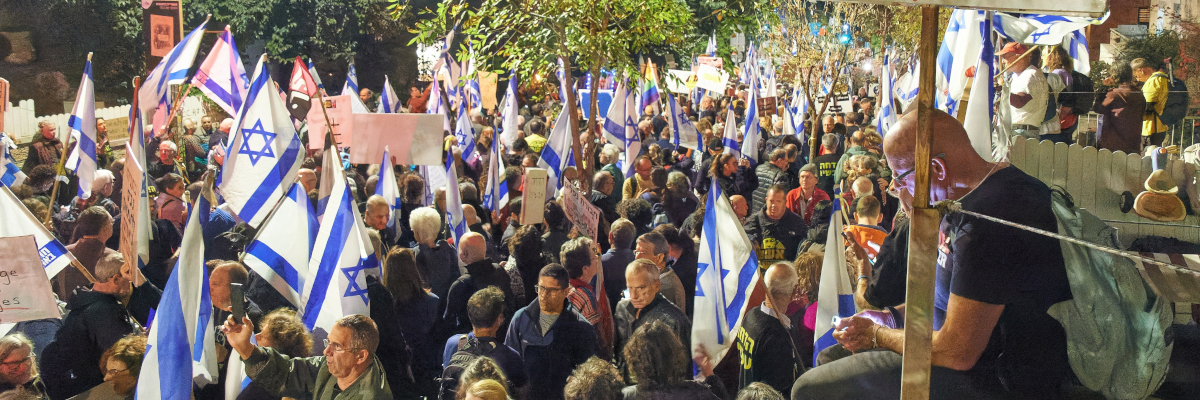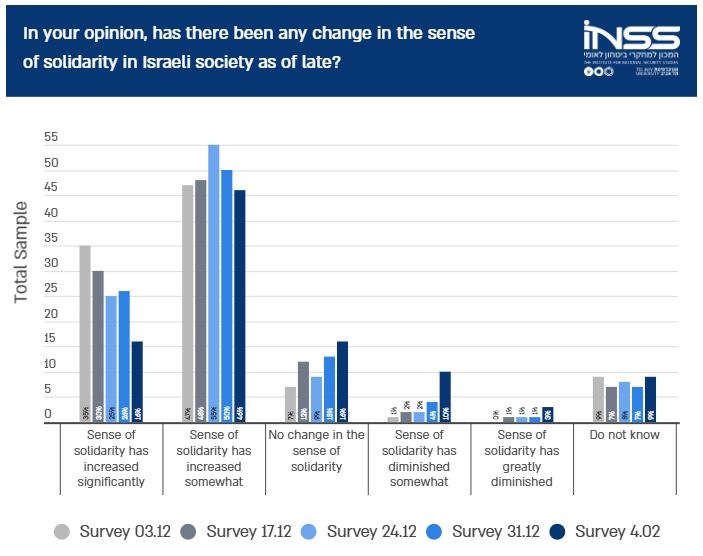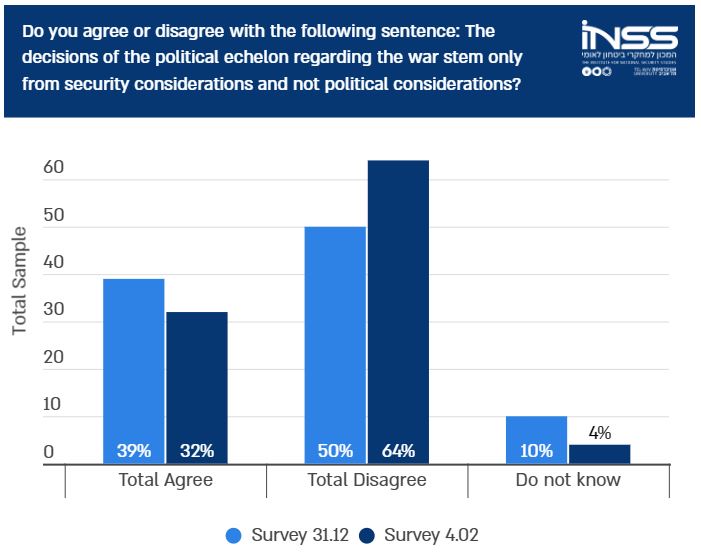Defense & Security
The Return of the Political to the National Discourse: Implications for National Resilience During War

Image Source : Shutterstock
Subscribe to our weekly newsletters for free
If you want to subscribe to World & New World Newsletter, please enter
your e-mail
Defense & Security

Image Source : Shutterstock
First Published in: Mar.06,2024
May.03, 2024
Five months into the war, and it seems that the political and social divisions of October 6 have returned to the center stage, reshaped by issues relating to what is happening on the battlefield, the future of the war, and the fate of the hostages. This may have serious consequences for Israel’s social resilience and national security Political disputes and polarization have, of late, returned to the forefront of the public and media discourse in Israel. While one could view this trend as seemingly signaling a return to some kind of normalcy, which is a positive aspect during wartime, it also poses significant challenges to the resilience of Israeli society. A polarizing discourse harms social solidarity, undermines trust in state bodies and the decision-making process, and casts doubts regarding the motives of civil-society organizations. Considering this, policymakers and politicians in Israel should pay very close attention to the situation and try to avoid adding to the toxic and hurtful political discourse. Primarily, they should refrain from portraying sensitive issues related to the war—disagreements over which are perfectly legitimate—as polarizing political issues, such as the issue of the hostages. Over the past few weeks, the political and social disputes within Israeli society have returned to the forefront of the social and media discourse in Israel. Until then, the nation had been preoccupied with the war, creating an image of unity around the goals of the war. Recently, however, the social-political crisis within Israeli society—which was created due to the government’s attempts to advance its judicial/regime reform/revolution—has again reemerged in the public discourse over various issues, including those related directly to managing the war in Gaza. In general, these rifts manifest themselves in part in the context of the incumbent government, its priorities, and its conduct, as well as regarding civilian aspects of the war. These include, for example, the state budget that was recently approved in its first reading by the Knesset, or the amendments to the Military Service Law. This is in addition to politicians trading personal insults with each other and allegations that the prime minister wants to continue the war out of personal considerations and is not giving top priority to releasing the hostages held in Gaza, as most do not come from his traditional base of supporters. At the same time, the political disagreements have grown more extreme in terms of balancing between the goal of toppling Hamas by means of “an absolute military victory” and the efforts to free the hostages. Even the public campaign waged by the hostages’ families vis-à-vis the government has become more acute and could assume a political tone, partly because of disputes among the families that are being portrayed as political. The escalation in the political discourse on social media includes accusations of a campaign aimed to discredit the hostages’ families, as revealed in a report by the Fake Reporter organization, which alleged that social media influencers supporting the prime minister have attempted to portray the campaign of the hostage families as illegitimate and inauthentic. Similarly, the issue of humanitarian aid to residents of the Gaza Strip also has led to demonstrations at the border crossings, some of which have been violent, requiring police intervention. There has also been significant political debate regarding “the day after” the war. This includes the far-right’s proposal to resettle Gaza and debates on the feasibility of incorporating Palestinian factions into any future agreements concerning the governance and civilian management of Gaza. Research and polls have suggested that these disagreements often align with the political positions that these people had before the war. During the first weeks of the war, any extremist political discourse was widely deemed as inappropriate, with emphasis placed on fostering national unity (“Together we will win”). Even those conducting political polls were criticized, although polls have since become routine again. The resurgence of the political rifts is reflected in the resumption and spread of public protests—on both sides of the political divide and on a variety of issues. Demonstrations calling for the prime minister to resign have resumed, and many organizations—such as the Kaplan Force and Brothers in Arms—have announced their intention to intensify their protests. In this context, 56 percent of the respondents in the latest poll conducted by the Institute for National Security Studies on February 4 said that they were concerned or very concerned about the state of Israeli society on the day after the war.[1] The resurgence of the political discourse and protests in Israeli society could be seen as a positive sign of recovery from the paralysis caused by the collective trauma of the events of October 7. Research literature recognizes the phenomenon of “rallying round the flag”; when a crisis threatens the fundamental values of a given society, the public will join forces and unconditionally support the decisions of the political leadership regarding how to resolve that crisis. Immediately after October 7, Israeli society became unified in support of the war’s objectives and the IDF, setting aside pre-existing divisions and rifts from before Hamas’s attack. This unity, still largely maintained today, is reflected in the mainstream media. Additionally, early in the war, civil-society organizations—including those previously identified as political—joined together in volunteer efforts and, most importantly, agreed to set aside divisive political discourses. As the war shifts into a low-intensity conflict, which could last many months, Israeli society seems to be adapting to a “war routine.” This shift has resulted in a diminished need for unity, bringing the socio-political divisions back to the forefront of the discourse with renewed vigor. The reappearance of political disputes poses a challenge to the resilience of Israeli society and its capacity to endure a prolonged and strenuous war. Polarization could hinder Israel’s recovery from the crisis on several levels. The polarizing discourse erodes social solidarity, a crucial component of social resilience; solidarity enables a society to unite and work together, including through extensive civic involvement, to rebuild the ruins— both metaphorical and literal. Polarization also affects a society’s self-perception and the levels of hope and optimism, which are vital to social resilience. The return of the polarizing discourse—especially if it becomes violent—undermines the social solidarity as it places an emphasis on what divides and distinguishes different sectors in society, undermines trust in the state’s institutions, and threatens the necessary civic cooperation. An illustration of the negative impact of renewed polarization is evident in the INSS poll from February 4 (see figure 1), which showed a decline in Israel’s sense of solidarity, and therefore its social resilience for the first time since the war began. It is still true that, in most of the resilience indices, the positive trends remain and are relatively stable. Nonetheless, the data signals a concerning shift in the public sentiment, with the resumption of a toxic public discourse already causing damage.

For a society to successfully recover from a profound and severe crisis, trust in the decision-making process and the country’s leaders is essential, partly to ensure that the public will cooperate with the implementation of decisions and to bolster the general sense of security. The resumption of the divisive political discourse stains many of the decisions that are currently being made—on civic and military matters—with a political hue. For example, in the poll conducted on February 4, 56 percent of respondents claimed that they disagreed with the statement that the decisions of the political leadership regarding the hostage issue were based on relevant considerations rather than political considerations. In the same survey, 64 percent of respondents disagreed with the statement that the decisions taken by the political leadership regarding the war were based solely on military considerations and not political ones (see figure 2). This is a significant increase compared to the findings of the previous poll, conducted on December 31, which asked the same questions. These percentages, reflecting a lack of public trust in the government’s decisions, should be considered along with the low level of trust that the public expressed, in the February 4 survey, in the government itself (24 percent) and the prime minister (30 percent). Further evidence of the negative impact of the politicization of the discourse can be found in surveys conducted by Kimchi and others, showing that respondents who support the government perceive resilience to be higher across all parameters: national, communal, and personal. One explanation for this phenomenon is that supporters of the government have more trust in its decisions.[2]

It should be noted that while at the beginning of the war, civil society organizations, including groups that were active in the social protests, played a central role in ensuring that the Israeli economy and society continued to function, resuming their political involvement will make it difficult for them to serve as connecting social capital, which is essential for overcoming the internal crisis, especially in the face of the government’s weakness. The more their activities become tainted with toxic political overtones, the more the genuine disputes among the public will undermine the ability of these organizations to aid any aspect of the Israeli war effort; this, in turn, will weaken social resilience. In conclusion, the resumption of the political discourse and the polarization could significantly harm the ability of Israeli society to build its social resilience needed to recover from this major crisis. To limit these negative effects, Israeli policymakers should shun toxic political discourse as much as possible and avoid deepening the rifts and the polarization that exists in Israeli society as a whole—and especially as it relates to the war. [1] The surveys were based on a representative sample of the adult Jewish population in Israel and included 500 respondents. The surveys were conducted between October 12 to February 4, led by the Data Analytics Desk of INSS. The field work was conducted by the Rafi Smith Institute and was based on internet questionnaires. The maximum sampling error for each sample is ±4 percent at a 95 percent confidence level. [2] Shaul Kimchi and others, “Research Report: The Connections Between Public Resilience, Coping Indices, and Support for the Government, Three Months After the Outbreak of the War,” [Unpublished].
First published in :

Brig. Gen. (ret.) Dr. Meir Elran is a senior researcher and director of the Domestic research cluster of INSS, which includes research programs for Homeland Security and resilience, the Arab citizens in Israel, Society–Military and Israeli economics and national security. Brig. Gen. (ret.) Elran served in the IDF as a career officer for 24 years in senior command and staff positions, primarily in the Military Intelligence Directorate. His last post was deputy director of Military Intelligence (1987-1989). Meir Elran took an active role in the peace talks with Egypt and was an active member of the military delegation to the peace talks with the Hashemite Kingdom of Jordan. Following his retirement from the military Elran served as the chief of staff of the Tel Aviv municipality and afterwards as a senior consultant for strategic planning for government offices, including the Ministry of Defense, Education, Internal Security, and the National Security Council. Elran's main areas of academic research are homeland security, disaster management, and societal resilience in face of protracted terrorism. Dr. Elran has published numerous papers on these subjects and edited several memoranda and volumes, among these: The Second Lebanon War: Strategic Perspectives (with Shlomo Brom, published by Yediot Ahronot and INSS in 2007); Societal Resilience (with Alexander McLellan, published in 2012 by the Homeland Security and Analysis Institute in the US); and The IDF Strategy in the Perspective of National Security (with Siboni and Michael, published in 2016 by INSS). Elran holds a BA degree from the Hebrew University in Jerusalem in Political Science and Middle East Studies (1965), MA degree from Indiana University in International Relations and Russian Studies (1970), and PhD in Political Science from the Haifa University (2017). Dr. Elran also teaches at the University of Chicago in the Committee on International Relations (CIR).

Anat Shapira is a Neubauer Research Associate at the Terrorism and Low Intensity Conflict Program at the INSS and a PhD candidate in the Philosophy Department of Tel Aviv University. Her dissertation focuses on the Moral Foundations of War Ethics. In the course of her work, Anat examines the effect that adopting different normative approaches has on questions like "when is it just to go to war?" and "Which means is it just to use during a war". In her work in the INSS she focuses on these questions with regard to Terrorism, and on the interaction between these questions and the cognitive warfare waged by terrorist organizations. Anat finished her BA in Philosophy and the University of Haifa honours program Magna Cum Laude, and proceeded to do her MA in Philosophy at the same university. She is also a lecturer on philosophy and rhetoric, public-speaking and persuasion in Israeli Academia alongside the public and private sector. In the past she has won many debate competitions in Israel and abroad and was twice designated as the best speaker (ESL) at the European Universities Debating Championship and once as the best speaker at the World Universities Debating Championship.
Unlock articles by signing up or logging in.
Become a member for unrestricted reading!